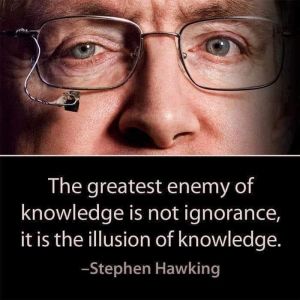Dunning Kruger effect: Difference between revisions
No edit summary |
mNo edit summary |
||
| (16 intermediate revisions by the same user not shown) | |||
| Line 1: | Line 1: | ||
''' | [[File:Hawkings quote.jpg|alt=Hawkings quote|thumb|'''''Figure 1.''' False confidence is a dangerous thing.'']] | ||
"''A sign of intelligence is an awareness of one's own ignorance.''" -- Niccolo Machiavelli | |||
'''The Dunning-Kruger effect is a type of [[Cognitive biases|cognitive bias]] where individuals with low ability, knowledge, or expertise in a particular domain tend to overestimate their own competence. This occurs because their lack of knowledge prevents them from accurately assessing their own performance or recognizing the abilities of others. On the flip side, individuals who are highly skilled or knowledgeable in a domain often underestimate their own abilities, as they assume others possess similar levels of competence.'''<ref>'''Unskilled and Unaware of It: How Difficulties in Recognizing One's Own Incompetence Lead to Inflated Self-Assessments.''' Kruger, Justin & Dunning, David. (2000). Journal of Personality and Social Psychology. 77. 1121-34. 10.1037//0022-3514.77.6.1121. Accessed on 25 January 2023 via https://www.researchgate.net/publication/12688660_Unskilled_and_Unaware_of_It_How_Difficulties_in_Recognizing_One's_Own_Incompetence_Lead_to_Inflated_Self-Assessments </ref>'''.''' | |||
< | |||
This effect has been found to be more pronounced in people with strong negative attitudes to science<ref>'''People with more extreme attitudes towards science have self-confidence in their understanding of science, even if this is not justified'''. Cristina Fonseca, Jonathan Pettitt, Alison Woollard, Adam Rutherford, Wendy Bickmore. PLOS Biology. Published: January 24, 2023. https://doi.org/10.1371/journal.pbio.3001915</ref> and more specifically, men<ref>'''Gender Differences in Self-Estimated Intelligence: Exploring the Male Hubris, Female Humility Problem'''. Front. Psychology 07 February 2022 | https://doi.org/10.3389/fpsyg.2022.812483 | |||
</ref>. The societal implications of the Dunning-Kruger effect are profound. Individuals who overestimate their abilities are more likely to assert themselves in discussions, make decisions with undue confidence, or take on leadership roles, even when they may not be the best candidates. This can lead to the spread of misinformation, poor decision-making in professional or political arenas, and the marginalization of experts or those with more nuanced understanding. This dynamic is particularly concerning in fields where accurate knowledge is crucial, such as medicine, finance, or governance. | |||
==== Hero's Journey ==== | |||
[[File:Dunning Kruger.png|alt=Dunning Kruger|thumb|'''Figure 2'''. Dunning Kruger as the Hero's Journey]] | |||
The Dunning-Kruger effect and the hero's journey share an intriguing parallel in their depiction of personal growth and transformation, but from opposite perspectives. The Dunning-Kruger effect illustrates how individuals with limited knowledge often overestimate their abilities, unaware of the challenges ahead, similar to the early stage of the hero’s journey, where the protagonist is naive or overconfident before facing trials (See '''Figure 2'''). However, while the hero's journey involves a transformative process of learning, humility, and eventual mastery, those affected by the Dunning-Kruger effect may remain stuck in their overconfidence unless confronted by their limitations, preventing true growth. Both concepts highlight the journey from ignorance to awareness, but only the hero achieves wisdom by confronting their inadequacies and evolving. | |||
=== References === | === References === | ||
Latest revision as of 09:30, 28 January 2025
"A sign of intelligence is an awareness of one's own ignorance." -- Niccolo Machiavelli
The Dunning-Kruger effect is a type of cognitive bias where individuals with low ability, knowledge, or expertise in a particular domain tend to overestimate their own competence. This occurs because their lack of knowledge prevents them from accurately assessing their own performance or recognizing the abilities of others. On the flip side, individuals who are highly skilled or knowledgeable in a domain often underestimate their own abilities, as they assume others possess similar levels of competence.[1].
This effect has been found to be more pronounced in people with strong negative attitudes to science[2] and more specifically, men[3]. The societal implications of the Dunning-Kruger effect are profound. Individuals who overestimate their abilities are more likely to assert themselves in discussions, make decisions with undue confidence, or take on leadership roles, even when they may not be the best candidates. This can lead to the spread of misinformation, poor decision-making in professional or political arenas, and the marginalization of experts or those with more nuanced understanding. This dynamic is particularly concerning in fields where accurate knowledge is crucial, such as medicine, finance, or governance.
Hero's Journey
The Dunning-Kruger effect and the hero's journey share an intriguing parallel in their depiction of personal growth and transformation, but from opposite perspectives. The Dunning-Kruger effect illustrates how individuals with limited knowledge often overestimate their abilities, unaware of the challenges ahead, similar to the early stage of the hero’s journey, where the protagonist is naive or overconfident before facing trials (See Figure 2). However, while the hero's journey involves a transformative process of learning, humility, and eventual mastery, those affected by the Dunning-Kruger effect may remain stuck in their overconfidence unless confronted by their limitations, preventing true growth. Both concepts highlight the journey from ignorance to awareness, but only the hero achieves wisdom by confronting their inadequacies and evolving.
References
- ↑ Unskilled and Unaware of It: How Difficulties in Recognizing One's Own Incompetence Lead to Inflated Self-Assessments. Kruger, Justin & Dunning, David. (2000). Journal of Personality and Social Psychology. 77. 1121-34. 10.1037//0022-3514.77.6.1121. Accessed on 25 January 2023 via https://www.researchgate.net/publication/12688660_Unskilled_and_Unaware_of_It_How_Difficulties_in_Recognizing_One's_Own_Incompetence_Lead_to_Inflated_Self-Assessments
- ↑ People with more extreme attitudes towards science have self-confidence in their understanding of science, even if this is not justified. Cristina Fonseca, Jonathan Pettitt, Alison Woollard, Adam Rutherford, Wendy Bickmore. PLOS Biology. Published: January 24, 2023. https://doi.org/10.1371/journal.pbio.3001915
- ↑ Gender Differences in Self-Estimated Intelligence: Exploring the Male Hubris, Female Humility Problem. Front. Psychology 07 February 2022 | https://doi.org/10.3389/fpsyg.2022.812483

